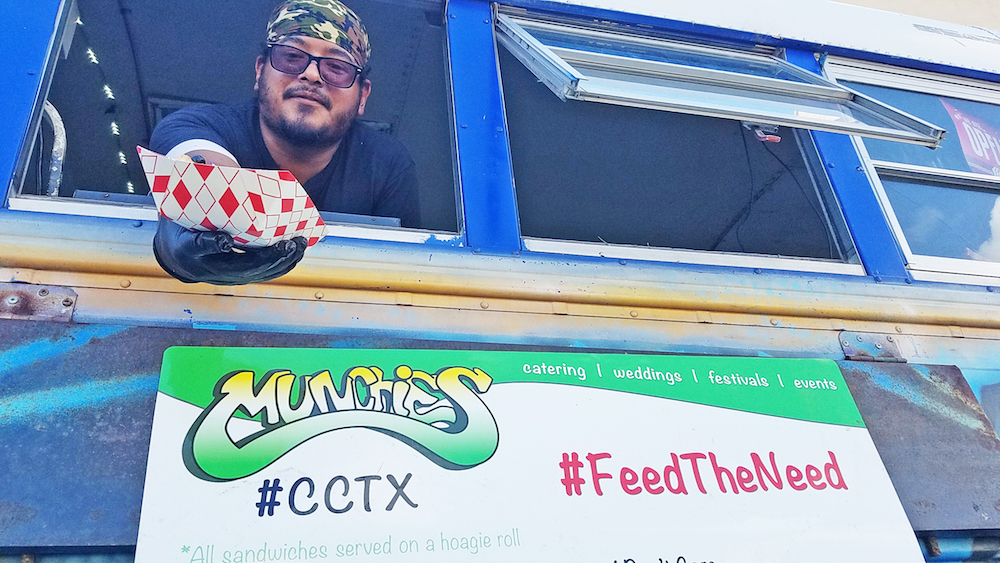
Food truck vendor Eddy Corona of Munchie’s Grub Bus offers fusion Spanish food with a tropical twist. Photo by Jane Kathleen Gregorio
When Munchie’s Grub Bus snags a spot on Shoreline Boulevard in Corpus Christi, business is good. A purveyor of savory sandwiches, street tacos and a fusion of Spanish foods with a tropical twist, Munchie’s is one of the regulars in the city’s food truck armada. To accommodate the growing popularity of mobile food vendors, which can always be found at events across town, the city started a pilot program to test more permanent, daily locations.
The Corpus Christi Mobile Vending Pilot Program began in late October and is now taking applications for the second quarter, which begins in January. All vendors, whether already in the program or just coming aboard, have to apply each quarter.
The one-year test period will end in August 2018 with a full report for the City Council. Information gathered will be used to decide whether or not to make the program permanent, said Renee Couture, assistant traffic engineer for the city of Corpus Christi. The program is a joint project of the city’s Traffic Engineering Division and the Environmental Health Services Division.
The traffic division decides where the best spots might be for a food truck or two based on possible demand and safety concerns. The environmental health division vets the applicants, making sure all health certificates and vendor licenses are up to date before granting approval.
Currently, eight spots in the city have been approved for daily food vendors. Munchie’s was recently at the test spot on Mesquite Street and Twig, where the chef was lamenting the lack of foot traffic.
“The Bayfront or Shoreline Drive locations have the best foot traffic from tourists,” said Eddy Corona, who prefers a spot near the Selena statue for maximum exposure. Munchie’s, which has several food trucks, is owned by Xavier Ramos and Hank Harrison.
The Munchie’s gang has mixed reactions regarding the pilot program.
“We feel it could be better organized,” Corona said. “Because this is first-come, first-served, some of the challenges we are facing are having to compete for the spots we want.”
Feedback from vendors is an important part of the program, said Lauren Rabe, public health division manager for environmental health. When asked how the city would measure the program’s success, she immediately answered, “the vendors.”
“We are looking for their feedback throughout this process,” she said. “We are able to do monthly checks to see how much business is being generated at each spot.”
The spots were actually chosen by vendors, said Rabe and Couture, and vendors are the ones who instigated the program in the first place.
“We had vendors who approached the city and asked about more opportunities,” Couture said. “That’s how it started — as a discussion of possibilities to expand in public rights of way.”
Rabe and Couture both urge vendors to suggest new locations that can be scouted and approved and possibly opened up to food trucks during an upcoming quarter.
“We are tracking the sites,” Couture said. “We are tracking the usage, the demand from the public, any safety concerns.”
If successful, the program could grow across South Texas. The city will make a presentation about the pilot program at the annual conference of the Texas Environmental Health Association South Texas Chapter in South Padre in December.
“People in the Valley want more information so they can implement something down there, too,” Rabe said. “They really don’t have anything like this down there. We are the first of its kind south of San Antonio. It’s a leap in the right direction for both the government and the public sector side.”
Vendors wanting to participate in the pilot program should contact the Traffic Engineering Division at (361) 826-3547 or mobilevending@cctexas.com.





